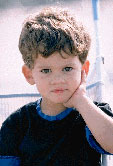- 10 Strategies to Overcome Insomnia
- Could Artificial Sweeteners Be Aging the Brain Faster?
- Techniques for Soothing Your Nervous System
- Does the Water in Your House Smell Funny? Here’s Why
- Can a Daily Dose of Apple Cider Vinegar Actually Aid Weight Loss?
- 6 Health Beverages That Can Actually Spike Your Blood Sugar
- Treatment Options for Social Anxiety Disorder
- Understanding the Connection Between Anxiety and Depression
- How Daily Prunes Can Influence Cholesterol and Inflammation
- When to Take B12 for Better Absorption and Energy
Disaster Aftereffects May Linger for Children


Natural and man-made disasters can put children’s health and development at risk for years to come, a new report from a leading group of pediatricians suggests.
“Disasters touch the lives of millions of children every year, and children are especially vulnerable to the aftereffects of these events,” said Dr. David Schonfeld, lead author of the report from the American Academy of Pediatrics (AAP).
“As pediatricians, we are in an excellent position to detect and address a breadth of problems following a disaster, as well as to counsel families and communities on how to be prepared for a crisis situation,” he said in an academy news release. Schonfeld is director of the National Center for School Crisis and Bereavement at the University of Southern California School of Social Work.
Nearly 14 percent of children in the United States between the ages of 2 and 17 have been exposed to some type of disaster, the report showed. This includes natural disasters like earthquakes, fires, floods and disease outbreaks, as well as man-made disasters such as industrial accidents, war and terrorism acts.
Adjustment problems among children who’ve experienced a crisis or lived through a disaster are a significant public health issue, the academy cautioned.
But these kids often show no visible signs of trouble. Even those who develop post-traumatic stress disorder may not be diagnosed unless their doctor specifically asks about their symptoms, according to the report.
Trouble sleeping or getting up in the morning may be a red flag, the report found. Similarly, sudden difficulty concentrating could be a warning sign of emotional struggles.
Other behaviors parents should watch for after a disaster include:
- Changes in eating habits: Children may lose their appetite or eat more.
- Withdrawal: Kids may be less willing to engage in social activities with friends or adults. They may seem sad or even depressed.
- Anxiety: Children who’ve experienced one disaster may worry it will happen again. They may also develop unrelated fears, such as fear of the dark or separation anxiety.
- Unexplained symptoms: Some children coping with emotional or psychological stress will complain of unexplained physical symptoms — a condition called somatization.
- Regression: After a disaster, some kids may wet the bed, become more irritable or become disruptive.
- Risk-taking: Older kids and teens, in particular, may engage in more risky behaviors, including substance abuse and sexual activity.
Parents who notice these warning signs should discuss their concerns with their child’s pediatrician, says the report, published online Sept. 14 in Pediatrics.
Meanwhile, doctors should be aware that disasters are often followed by a string of negative events, such as financial worries, the loss of loved ones, domestic violence and problems with parents’ health or marriage, which could place added stress on children, the report showed.
Dr. Sandra Hassink, president of the AAP, said in the news release, “Especially as we mark the 10th anniversary of Hurricane Katrina, which showed the medical profession to be underprepared for the rippling effects of disaster, it is crucial that we are fully ready to protect and heal children in the face of traumatic events.”
More information
The U.S. Federal Emergency Management Agency provides more information on how to cope with disasters.
Source: HealthDay
Copyright © 2026 HealthDay. All rights reserved.










